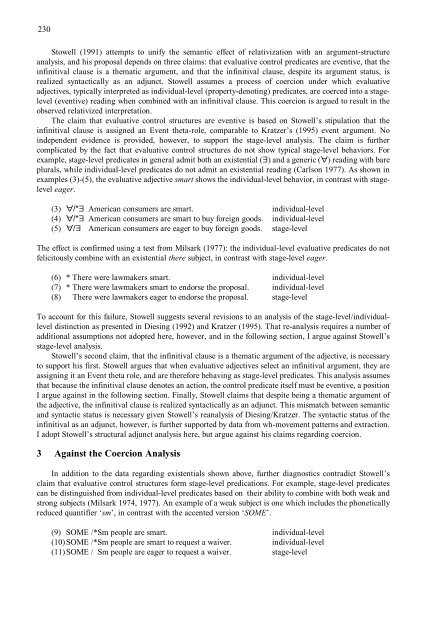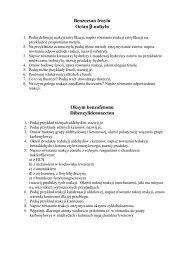Evaluative Adjectives: An Adjunct Control Analysis
Evaluative Adjectives: An Adjunct Control Analysis
Evaluative Adjectives: An Adjunct Control Analysis
You also want an ePaper? Increase the reach of your titles
YUMPU automatically turns print PDFs into web optimized ePapers that Google loves.
230<br />
Stowell (1991) attempts to unify the semantic effect of relativization with an argument-structure<br />
analysis, and his proposal depends on three claims: that evaluative control predicates are eventive, that the<br />
infinitival clause is a thematic argument, and that the infinitival clause, despite its argument status, is<br />
realized syntactically as an adjunct. Stowell assumes a process of coercion under which evaluative<br />
adjectives, typically interpreted as individual-level (property-denoting) predicates, are coerced into a stagelevel<br />
(eventive) reading when combined with an infinitival clause. This coercion is argued to result in the<br />
observed relativized interpretation.<br />
The claim that evaluative control structures are eventive is based on Stowell’s stipulation that the<br />
infinitival clause is assigned an Event theta-role, comparable to Kratzer’s (1995) event argument. No<br />
independent evidence is provided, however, to support the stage-level analysis. The claim is further<br />
complicated by the fact that evaluative control structures do not show typical stage-level behaviors. For<br />
example, stage-level predicates in general admit both an existential (∃) and a generic (∀) reading with bare<br />
plurals, while individual-level predicates do not admit an existential reading (Carlson 1977). As shown in<br />
examples (3)-(5), the evaluative adjective smart shows the individual-level behavior, in contrast with stagelevel<br />
eager.<br />
(3) ∀/*∃ American consumers are smart. individual-level<br />
(4) ∀/*∃ American consumers are smart to buy foreign goods. individual-level<br />
(5) ∀/∃ American consumers are eager to buy foreign goods. stage-level<br />
The effect is confirmed using a test from Milsark (1977): the individual-level evaluative predicates do not<br />
felicitously combine with an existential there subject, in contrast with stage-level eager.<br />
(6) * There were lawmakers smart. individual-level<br />
(7) * There were lawmakers smart to endorse the proposal. individual-level<br />
(8) There were lawmakers eager to endorse the proposal. stage-level<br />
To account for this failure, Stowell suggests several revisions to an analysis of the stage-level/individuallevel<br />
distinction as presented in Diesing (1992) and Kratzer (1995). That re-analysis requires a number of<br />
additional assumptions not adopted here, however, and in the following section, I argue against Stowell’s<br />
stage-level analysis.<br />
Stowell’s second claim, that the infinitival clause is a thematic argument of the adjective, is necessary<br />
to support his first. Stowell argues that when evaluative adjectives select an infinitival argument, they are<br />
assigning it an Event theta role, and are therefore behaving as stage-level predicates. This analysis assumes<br />
that because the infinitival clause denotes an action, the control predicate itself must be eventive, a position<br />
I argue against in the following section. Finally, Stowell claims that despite being a thematic argument of<br />
the adjective, the infinitival clause is realized syntactically as an adjunct. This mismatch between semantic<br />
and syntactic status is necessary given Stowell’s reanalysis of Diesing/Kratzer. The syntactic status of the<br />
infinitival as an adjunct, however, is further supported by data from wh-movement patterns and extraction.<br />
I adopt Stowell’s structural adjunct analysis here, but argue against his claims regarding coercion.<br />
3 Against the Coercion <strong>An</strong>alysis<br />
In addition to the data regarding existentials shown above, further diagnostics contradict Stowell’s<br />
claim that evaluative control structures form stage-level predications. For example, stage-level predicates<br />
can be distinguished from individual-level predicates based on their ability to combine with both weak and<br />
strong subjects (Milsark 1974, 1977). <strong>An</strong> example of a weak subject is one which includes the phonetically<br />
reduced quantifier ‘sm’, in contrast with the accented version ‘SOME’.<br />
(9) SOME /*Sm people are smart. individual-level<br />
(10) SOME /*Sm people are smart to request a waiver. individual-level<br />
(11) SOME / Sm people are eager to request a waiver. stage-level



